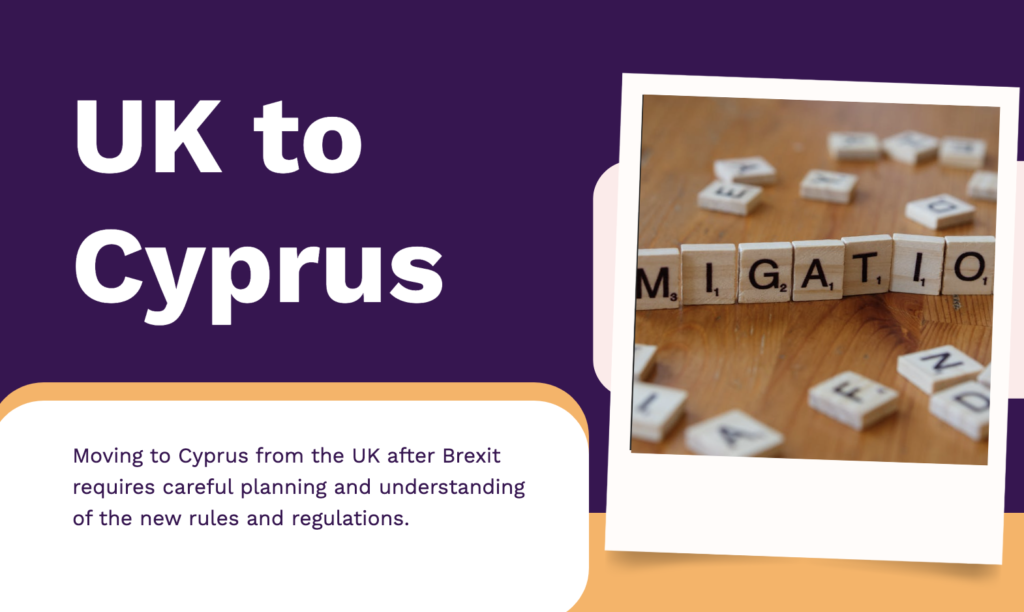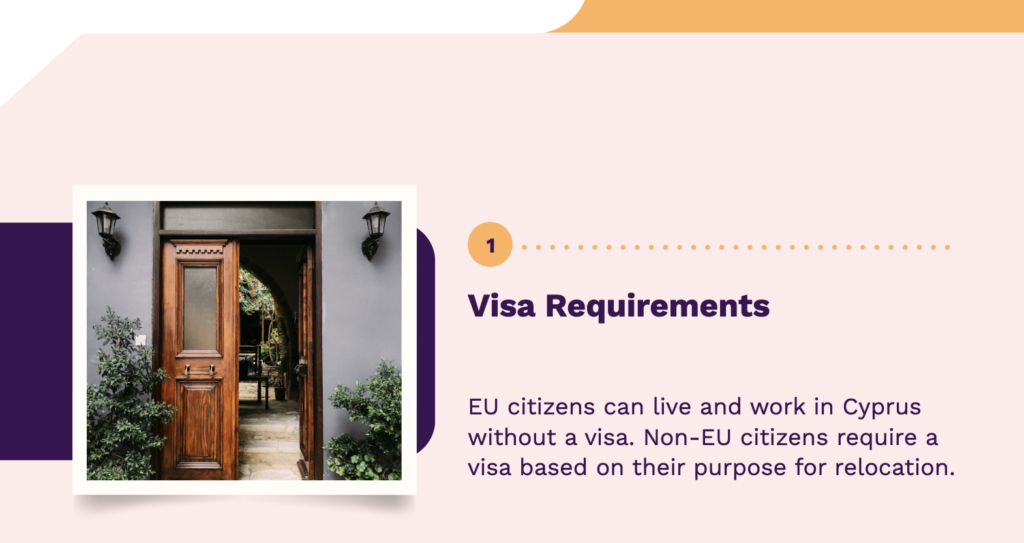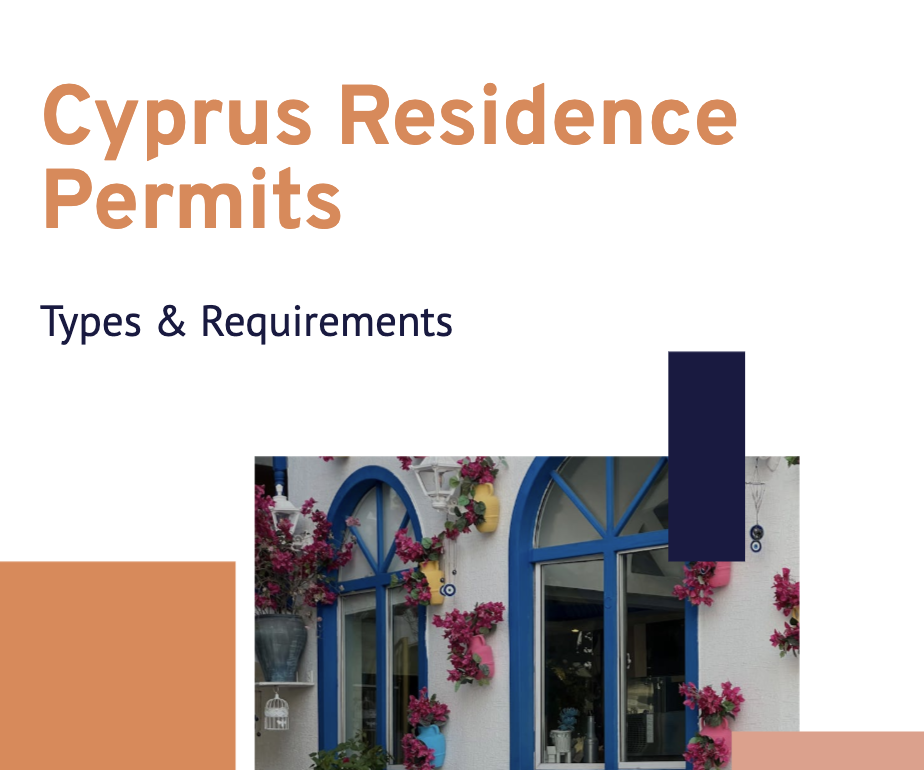Table of Contents
ToggleHow to Move from the UK to Cyprus After Brexit
Introduction to Moving to Cyprus
Considering a move from the UK to Cyprus? The sun-drenched island offers an enticing mix of beautiful landscapes, a relaxed lifestyle, and a warm Mediterranean climate. This Mediterranean gem provides a unique blend of ancient history and modern amenities, making it an attractive destination for expats. Beyond the picturesque beaches and scenic mountains, Cyprus is known for its vibrant culture and welcoming community, which can make settling in easier for newcomers.
When thinking about relocating, it’s essential to evaluate your priorities and lifestyle preferences. Cyprus boasts various regions that cater to different tastes, whether you prefer the bustling city life of Nicosia, the cosmopolitan flair of Limassol, or the more laid-back atmosphere of coastal towns like Paphos. Each area has its own charm and offers a variety of housing options, social activities, and local amenities.
Understanding the implications of your move, particularly in a post-Brexit context, will help you navigate the transition smoothly. The island’s public and private sectors provide numerous services to assist newcomers, ranging from real estate agencies to language schools. Learning about the local culture, customs, and even some basic Greek phrases can significantly enhance your experience and help you build connections within the community.
It’s also worth considering the practical aspects of living in Cyprus, such as the cost of living, which can be more affordable than in the UK. Whether you’re planning to work, retire, or join family members, Cyprus offers a variety of opportunities and a high quality of life. The island’s healthcare system and educational institutions are well-regarded, adding to the overall appeal for families and individuals alike.
Brexit and Its Impact
Brexit has significantly altered the landscape for UK citizens planning to relocate to EU countries, including Cyprus. With the end of free movement between the UK and EU nations, British citizens now face new immigration policies. This means that individuals moving to Cyprus from the UK must obtain visas and residency permits, which were not necessary before Brexit. It’s crucial to be aware of these changes to ensure a smooth relocation process.
For those considering employment in Cyprus, work permits are now required. These changes have introduced additional steps and paperwork that must be completed prior to making the move. The type of visa needed will depend on the purpose of the stay, such as employment, retirement, or joining family members.
Additionally, healthcare access has seen changes due to Brexit. While UK citizens previously relied on the European Health Insurance Card (EHIC), they must now make arrangements for private health insurance or ensure that they meet the eligibility criteria for accessing the Cypriot healthcare system.
Financial considerations are also impacted by Brexit. UK citizens should be aware of potential changes in taxation and financial regulations. It’s advisable to seek guidance from financial advisors to navigate these complexities.
Moreover, property ownership rules for UK citizens have been revised. Those interested in purchasing property in Cyprus may face different regulations than before Brexit. Consulting with local real estate experts and legal advisors can help clarify these new rules.
In summary, the end of free movement has introduced a series of changes and new requirements for UK citizens looking to move to Cyprus. Familiarizing oneself with these new regulations and seeking professional advice can greatly facilitate the transition.
Legal Requirements for Relocation
To relocate to Cyprus, UK citizens need to secure the appropriate visa or residency permit. The specific type of visa required depends on the individual’s circumstances, such as employment, retirement, or family reunification. For those planning to work in Cyprus, obtaining a work permit is essential.
Navigating the visa application process can be complex, so it’s beneficial to consult with immigration experts or local authorities who can provide guidance tailored to your situation. Applicants typically need to provide documentation such as proof of income, health insurance, and criminal background checks. Those intending to retire in Cyprus must demonstrate sufficient financial resources to support themselves without employment.
If you’re moving to Cyprus for family reunification, you will need to present documentation proving your relationship to the family member residing in Cyprus. Each visa type has specific requirements and it’s crucial to ensure all paperwork is accurately completed to avoid delays or complications.
Additionally, UK citizens must register with the local authorities upon arrival in Cyprus. This includes registering at the local district office and applying for a Residence Certificate, which is necessary for long-term stays. It’s advisable to start this process as soon as possible after arriving to ensure compliance with local regulations.
Understanding these legal requirements is vital for a successful relocation to Cyprus. Proper preparation can help you navigate these processes more efficiently, ensuring a smoother transition to your new life on the island.
Cost of Living in Cyprus
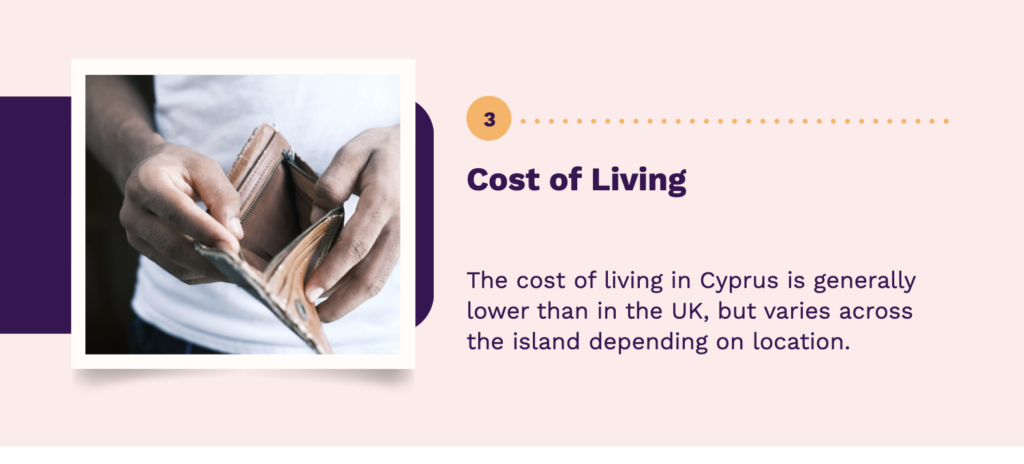
Cyprus offers a favorable cost of living compared to the UK, making it an attractive destination for those looking to stretch their budget further.
- Housing costs, whether for renting or buying, are generally lower, especially outside major cities like Nicosia and Limassol. The island’s real estate market provides diverse options, from modern apartments to traditional homes, allowing newcomers to find something that fits their needs and budget.
- Daily expenses such as groceries, dining out, and transportation are also more affordable. Fresh produce, local meats, and dairy products are reasonably priced, often less expensive than in the UK. Dining at local tavernas can be a delightful and cost-effective way to enjoy Cypriot cuisine, while international dining options are also available at various price points.
- Transportation costs, including fuel and public transit, tend to be lower in Cyprus. Many residents find that owning a car is practical and affordable, thanks to cheaper fuel prices and lower maintenance costs. Public transportation is also a viable option, with buses connecting major towns and cities.
- Utility costs, such as electricity, water, and internet, are typically reasonable. However, it’s wise to account for seasonal variations, as air conditioning can drive up electricity bills during the hot summer months.
- Healthcare and education, as previously mentioned, can also impact your budget. Public healthcare is available at a lower cost, while private health insurance is recommended for more comprehensive coverage. Educational expenses vary based on the type of school chosen, whether public, private, or international.
- Entertainment and leisure activities, such as gym memberships, movie tickets, and local excursions, are often more affordable, allowing for a balanced and enjoyable lifestyle without breaking the bank. Budgeting for these activities can help you make the most of your time on the island.
Healthcare and Education
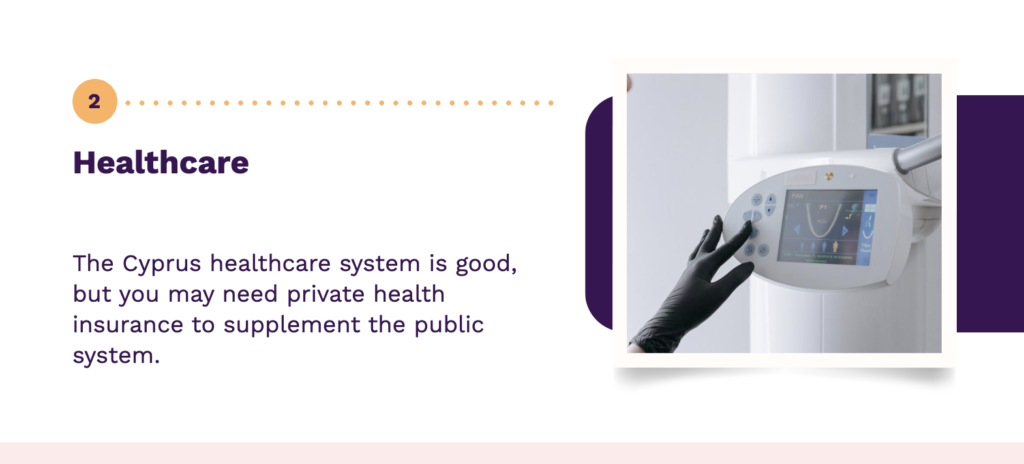
UK citizens relocating to Cyprus will find both public and private healthcare options available. The public healthcare system is funded by taxes and provides services at a lower cost, although it may require registration and proof of residency. Private healthcare is widely used for its higher standard of service and shorter wait times.
It’s advisable to obtain health insurance to cover private healthcare expenses, especially since the European Health Insurance Card (EHIC) is no longer valid for new treatments post-Brexit. Some expats also choose to access healthcare through local clinics and pharmacies, which are abundant and provide a range of services.
For families, Cyprus offers a variety of educational options. Public schools are available, providing education primarily in Greek. While these schools are free to residents, non-Greek-speaking children may face language barriers.
Private schools, on the other hand, offer bilingual or international curricula, including British and American systems. These schools often provide a higher standard of education and a more diverse environment but come with tuition fees.
International schools are another option, particularly for those looking for a curriculum that aligns closely with the UK system. These schools offer globally recognized programs such as the International Baccalaureate (IB) and are suitable for students planning to pursue higher education abroad.
Parents should research and visit potential schools to ensure they meet their children’s educational needs. Many schools offer open days or virtual tours, providing an opportunity to learn more about the facilities and teaching methods.
By carefully considering healthcare and educational options, newcomers can make informed decisions that contribute to a smooth transition and a high quality of life in Cyprus.
Finding a Place to Live

Choosing where to live in Cyprus is a critical decision for newcomers. The island offers a range of living environments, from bustling urban centers to tranquil coastal towns. Popular regions for expats include Paphos, known for its archaeological sites and relaxed ambiance; Limassol, which offers a cosmopolitan lifestyle with a thriving business community; and Nicosia, the island’s capital, which provides a mix of history and modernity.
When deciding between renting and buying, consider your long-term plans. Renting can be an excellent option for those wanting flexibility. It allows you to explore different areas before committing to a specific location. Rental properties vary widely, from modern apartments to traditional homes, and prices tend to be more affordable compared to the UK, particularly outside major urban centers.
If you’re looking to buy property, be sure to work with local real estate agents who understand the market intricacies and can help you find a home that suits your needs and budget. Property ownership rules have changed post-Brexit, so it’s important to consult legal advisors to navigate the new regulations effectively.
Factors to consider when selecting a neighborhood include proximity to amenities such as schools, healthcare facilities, and transportation links. Coastal towns offer a more laid-back lifestyle and easy access to beaches, while urban areas provide more business opportunities and cultural activities.
Public transportation in Cyprus is limited, so owning a car is often the most practical option for getting around. Researching your chosen area thoroughly and visiting potential neighborhoods can help you make an informed decision about where to settle on this beautiful island.
Cultural Differences and Lifestyle

Living in Cyprus means adapting to a lifestyle that’s both relaxed and community-oriented. Cypriots value social connections, and family plays a central role in daily life. You’ll notice that gatherings with extended family members and friends are frequent, often revolving around meals and traditional celebrations. These customs offer a wonderful opportunity to immerse yourself in local culture and build meaningful relationships.
Cyprus also has a rich calendar of festivals and public holidays that reflect its diverse history and cultural influences. Participating in these events can provide a deeper understanding of Cypriot traditions and a sense of belonging. From Easter celebrations to wine festivals, there’s always something happening that showcases the island’s vibrant culture.
The pace of life in Cyprus is generally slower compared to the UK. Shops may close in the afternoon for a siesta, and the work-life balance is often more relaxed. This laid-back approach can take some getting used to but offers a refreshing change from the hustle and bustle.
Learning a few basic Greek phrases can go a long way in daily interactions and is greatly appreciated by locals. It’s also helpful to understand and respect local customs and etiquette, such as greeting people with a handshake or kiss on the cheek and being mindful of dress codes in religious or formal settings.


Conclusion and Final Tips
Planning your move to Cyprus from the UK post-Brexit involves multiple considerations, but with the right preparation, it can be a smooth transition.
Familiarize yourself with the new visa and residency requirements, and seek professional advice when needed. Budgeting for your new life, including the cost of living, healthcare, and education, will help you manage your finances effectively. Choosing the right location to live is crucial, so take the time to explore different areas and understand what each has to offer.
Engage with the local community and make an effort to learn about Cypriot customs and traditions. This will not only enrich your experience but also help you build lasting relationships. Practical aspects like securing housing, registering with local authorities, and understanding transportation options should be tackled early on to avoid any hiccups.
Staying informed and flexible will be key to navigating the changes and making the most of your new life on the island. With thoughtful planning and an open mind, moving to Cyprus can be a highly rewarding experience that opens up new opportunities and a fulfilling lifestyle.


